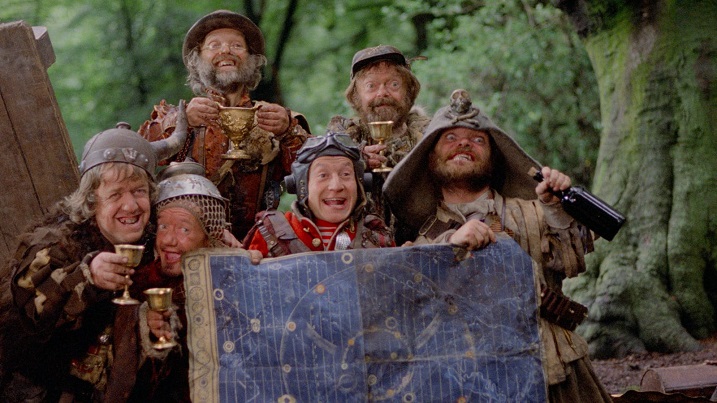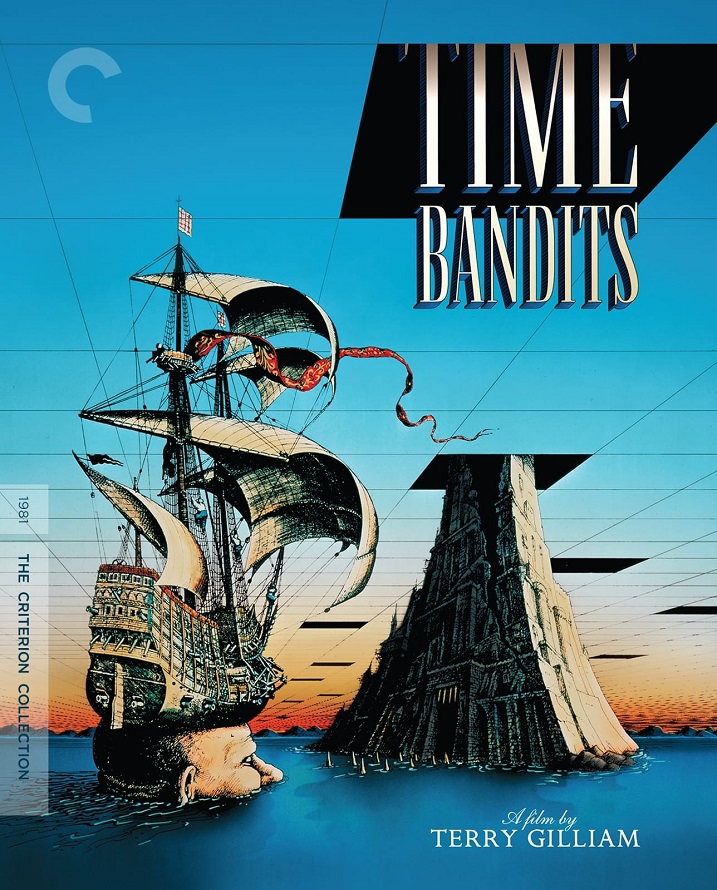Renoir, Jenkins, Gilliam & More Coming to The Criterion Collection June 2023
 Coming in June: Medicine for Melancholy, the sublime San Francisco–set feature debut of love and connection by Barry Jenkins, rubs shoulders with The Servant, Joseph Losey’s savagely witty British class-war classic, while two favorites—The Rules of the Game, Jean Renoir’s merciless critique of French society, and Time Bandits, Terry Gilliam’s fantastic odyssey to the limits of the imagination—arrive on 4K UHD. Plus, our recently announced nine-film box set Pasolini 101!
Coming in June: Medicine for Melancholy, the sublime San Francisco–set feature debut of love and connection by Barry Jenkins, rubs shoulders with The Servant, Joseph Losey’s savagely witty British class-war classic, while two favorites—The Rules of the Game, Jean Renoir’s merciless critique of French society, and Time Bandits, Terry Gilliam’s fantastic odyssey to the limits of the imagination—arrive on 4K UHD. Plus, our recently announced nine-film box set Pasolini 101!
–
–
–
THE RULES OF THE GAME
Considered one of the greatest films ever made, Jean Renoir’s The Rules of the Game is a scathing critique of corrupt French society cloaked in a comedy of manners in which a weekend at a marquis’s country château lays bare some ugly truths about a group of haut bourgeois acquaintances. The film has had a tumultuous history: it was subjected to cuts after the violent response of the audience at its 1939 premiere, and the original negative was destroyed during World War II; it wasn’t reconstructed until 1959. That version, which has stunned viewers for decades, is presented here.
1939 • 106 minutes • Black & White • Monaural • In French with English subtitles • 1.37:1 aspect ratio
4K UHD + BLU-RAY SPECIAL EDITION FEATURES
- New 4K restoration, with uncompressed monaural soundtrack
- One 4K UHD disc of the film and one Blu-ray of the film with special features
- Introduction to the film by director Jean Renoir
- Audio commentary written by film scholar Alexander Sesonske and read by filmmaker Peter Bogdanovich
- Comparison of the film’s two endings
- Selected-scene analysis by Renoir historian Chris Faulkner
- Excerpts from a 1966 French television program by filmmaker Jacques Rivette
- Part one of Jean Renoir,a two-part 1993 documentary by film critic David Thompson
- Video essay about the film’s production, release, and 1959 reconstruction
- Interview with film critic Olivier Curchod
- Interview from a 1965 episode of the French television series Les écrans de la villewith Jean Gaborit and Jacques Durand
- Interviews with set designer Max Douy; Renoir’s son, Alain; and actor Mila Parély
- PLUS: An essay by Sesonske; writings by Jean Renoir, Henri Cartier-Bresson, Bertrand Tavernier, and François Truffaut; and tributes to the film by J. Hoberman, Kent Jones, Paul Schrader, Wim Wenders, Robert Altman, and others
Available June 6, 2023
–
TIME BANDITS
In this fantastic voyage through time and space from Terry Gilliam, a boy named Kevin (Craig Warnock) escapes his gadget-obsessed parents to join a band of time travelers. Armed with a map stolen from the Supreme Being (Ralph Richardson), they plunder treasure from Napoleon (Ian Holm) and Agamemnon (Sean Connery)—but the Evil Genius (David Warner) is watching their every move. Featuring a darkly playful script by Gilliam and his Monty Python cohort Michael Palin (who also appears in the film), Time Bandits is at once a giddy fairy tale, a revisionist history lesson, and a satire of technology gone awry.
1981 • 116 minutes • Color • Stereo • 1.85:1 aspect ratio
DIRECTOR-APPROVED 4K UHD + BLU-RAY SPECIAL EDITION FEATURES
- New 4K restoration, supervised by director Terry Gilliam, with uncompressed stereo soundtrack
- One 4K UHD disc of the film presented in Dolby Vision HDR and one Blu-ray of the film with special features
- Audio commentary featuring Gilliam, cowriter-actor Michael Palin, and actors John Cleese, David Warner, and Craig Warnock
- Program on the creation of the film’s various historical periods and fantasy worlds, narrated by film writer David Morgan and featuring production designer Milly Burns and costume designer James Acheson
- Conversation between Gilliam and film scholar Peter von Bagh, recorded at the 1998 Midnight Sun Film Festival
- Appearance by actor Shelley Duvall on Tom Snyder’s Tomorrow show from 1981
- Gallery of rare photographs from the set
- Trailer
- English subtitles for the deaf and hard of hearing
- PLUS: An essay by critic David Sterritt
Available June 13, 2023
–
THE SERVANT
The prolific, ever provocative Joseph Losey, blacklisted from Hollywood and living in England, delivered a coolly modernist shock to the system of that nation’s cinema with this mesmerizing dissection of class, sexuality, and power. A dissolute scion of the upper crust (James Fox) finds the seemingly perfect manservant (a diabolical Dirk Bogarde, during his transition from matinee idol to art-house icon) to oversee his new London town house. But not all is as it seems, as traditional social hierarchies are gradually, disturbingly destabilized. Lustrously disorienting cinematography and a masterful script by playwright Harold Pinter merge in The Servant, a tour de force of mounting psychosexual menace.
1963 • 115 minutes • Black & White • Monaural • 1.66:1 aspect ratio
BLU-RAY SPECIAL EDITION FEATURES
- New 4K digital restoration, with uncompressed monaural soundtrack
- New program on director Joseph Losey by film critic Imogen Sara Smith
- Rare interview from 1976 with Losey by critic Michel Ciment
- Interview from 1996 with screenwriter Harold Pinter
- Interviews with actors Dirk Bogarde, James Fox, Sarah Miles, and Wendy Craig
- Trailer
- English subtitles for the deaf and hard of hearing
- PLUS: An essay by author Colm Tóibín
Available June 20, 2023
–
MEDICINE FOR MELANCHOLY
One of the great debut features of the twenty-first century, Barry Jenkins’s captivating, lo-fi romance Medicine for Melancholy unfolds against the backdrop of a rapidly gentrifying San Francisco, where a one-night stand between two young bohemians, Micah (Wyatt Cenac) and Jo’ (Tracey Heggins), spins off into a woozy daylong affair marked by moments of tenderness, friction, joy, and intellectual sparring as they explore their relationships to each other, the city, and their own Blackness. Shooting on desaturated video, Jenkins crafts an intimate exploration of alienation and connection graced with the evocative visual palette and empathetic emotional charge that has come to define his work.
2008 • 88 minutes • Color • 5.1 surround • 1.78:1 aspect ratio
DIRECTOR-APPROVED BLU-RAY SPECIAL EDITION FEATURES
- New high-definition digital master, approved by director Barry Jenkins and director of photography James Laxton, with 5.1 surround DTS-HD Master Audio soundtrack
- New audio commentary featuring Jenkins
- Audio commentary from 2008 featuring Jenkins, producers Justin Barber and Cherie Saulter, and editor Nat Sanders
- New program about the making of the film, featuring Sanders and actor Wyatt Cenac
- Camera test footage and blooper reel
- Trailer
- English subtitles for the deaf and hard of hearing
- PLUS: An essay by critic Danielle Amir Jackson
Available June 20, 2023
–
PASOLINI 101
One of the most original and controversial thinkers of the twentieth century, Italian polymath Pier Paolo Pasolini embodied a multitude of often seemingly contradictory ideologies and identities—and he expressed them all in his provocative, lyrical, and indelible films. Relentlessly concerned with society’s downtrodden and marginalized, he elevated pimps, hustlers, sex workers, and vagabonds to the realm of saints, while depicting actual saints with a radical earthiness. Traversing the sacred and the profane, the ancient and the modern, the mythic and the personal, the nine uncompromising, often scandal-inciting features he made in the 1960s still stand—on this, the 101st anniversary of his birth—as a monument to his daring vision of cinema as a form of resistance.
NINE-BLU-RAY SPECIAL EDITION COLLECTOR’S SET FEATURES
- Nine feature films: Accattone, Mamma Roma, Love Meetings, The Gospel According to Matthew, The Hawks and the Sparrows, Oedipus Rex, Teorema, Porcile, and Medea
- New 4K digital restorations of seven films and 2K digital restorations of Teoremaand Medea, with uncompressed monaural soundtracks
- Two shorts made by director Pier Paolo Pasolini for anthology films: La ricotta(1963) and The Sequence of the Paper Flower (1969)
- Two documentaries made by Pasolini during his travels
- New program on Pasolini’s visual style as told through his personal writing, narrated by actor Tilda Swinton and writer Rachel Kushner
- Audio commentaries on Accattoneand Teorema
- Documentaries on Pasolini’s life and career featuring archival interviews with the director and his close collaborators
- Episode from 1966 of the French television program Cinéastes de notre temps
- Interviews with filmmakers and scholars
- Trailers
- New English subtitle translations
- PLUS: Deluxe packaging, including a 100-page book featuring an essay and notes on the films by critic James Quandt, and writings and drawings by Pasolini
ACCATTONE
1961 • 117 minutes • Black & White • Monaural • In Italian with English subtitles • 1.37:1 aspect ratio
Poet and painter turned filmmaker Pier Paolo Pasolini courted controversy with his very first feature by using Catholic iconography and liturgical music to render a plaintive, brutally beautiful portrait of a shiftless Roman pimp and thief (then-nonprofessional Franco Citti, in a revelatory performance) whose life of petty crime turns increasingly desperate when the woman who supports him is imprisoned. Melding a hardscrabble neorealist milieu with classical influences, Pasolini offers a vision of underclass struggle as a kind of modern sainthood.
MAMMA ROMA
1962 • 106 minutes • Black & White • Monaural • In Italian with English subtitles • 1.85:1 aspect ratio
Anna Magnani is Mamma Roma, a middle-aged prostitute who attempts to extricate herself from her sordid past for the sake of her son. Highlighting director Pier Paolo Pasolini’s lifelong fascination with the marginalized and dispossessed, Mamma Roma offers an unflinching, neorealistic look at the struggle for survival in postwar Italy. Though initially banned in the country for obscenity, today the film remains a classic, featuring a powerhouse performance by one of cinema’s greatest actors and offering a glimpse at Pasolini in the process of finding his style.
LOVE MEETINGS
1964 • 92 minutes • Black & White • Monaural • In Italian with English subtitles • 1.85:1 aspect ratio
Let’s talk about sex. In this radically engaged and engaging documentary, Pier Paolo Pasolini takes to the streets, town squares, beaches, factories, and universities of 1960s Italy to solicit everyday citizens’ thoughts on a host of hot-button subjects, including sex work, gender equality, homosexuality, and divorce (then illegal in Italy). What emerges is both a kaleidoscopic cross section of faces and places—from the industrialized cities of the North to the rural villages of the South—and an incisive portrait of a society where, despite the rapid modernization brought on by the postwar “economic miracle,” hypocrisy, repression, and conformism still hold sway.
THE GOSPEL ACCORDING TO MATTHEW
1964 • 137 minutes • Black & White • Monaural • In Italian with English subtitles • 1.85:1 aspect ratio
A biblical epic that only the Marxist dissident Pier Paolo Pasolini could make, this intensely faithful adaptation of Saint Matthew’s Gospel depicts the life and teachings of Jesus Christ (Enrique Irazoqui, a Spanish economics student and Communist activist), whose unwavering compassion for the poor and defiant condemnation of moral hypocrisy make him a perhaps unexpected embodiment of the director’s own worldview. Stunningly shot amid the timeless landscapes of southern Italy and set to a soundtrack that encompasses everything from Bach to Black spirituals, The Gospel According to Matthew cuts past dogma and straight to the core of Jesus’s radical humanism.
THE HAWKS AND THE SPARROWS
1966 • 89 minutes • Black & White • Monaural • In Italian with English subtitles • 1.85:1 aspect ratio
While wandering the countryside, a pair of father-and-son vagabonds (played respectively by Italian cinema legend Totò, in his final major film role, and Ninetto Davoli) happen upon a talking crow who spouts philosophy and launches them on a freewheeling picaresque through time, space, and the margins of a rapidly modernizing Italy. A comic Marxist fable that balances heady ideas about religion, poverty, and class struggle with irreverent slapstick sight gags, The Hawks and the Sparrows finds Pasolini at his lightest yet as stingingly subversive as ever.
OEDIPUS REX
1967 • 104 minutes • Color • Monaural • In Italian with English subtitles • 1.85:1 aspect ratio
Pier Paolo Pasolini’s powerfully iconoclastic take on Sophocles’s tragedy blends eras and cultures to create a searing exploration of fate, free will, and the things we fear most in ourselves. Shot amid the stark, elemental landscapes of the Moroccan desert, and set in an indefinable ancient past, this bold reimagining casts the filmmaker’s frequent collaborator Franco Citti as the eponymous foundling, whose willful blindness to his own nature unleashes a cataclysmic reckoning. With a prologue and epilogue set in twentieth-century Italy, Pasolini connects the story to his own upbringing, daring to bare his soul on-screen.
TEOREMA
1968 • 98 minutes • Color • Monaural • In Italian with English subtitles • 1.85:1 aspect ratio
With Teorema, a coolly cryptic exploration of bourgeois spiritual emptiness, Pier Paolo Pasolini moved beyond the poetic, proletarian earthiness that first won him renown. Terence Stamp stars as the mysterious stranger—perhaps an angel, perhaps a devil—who, one by one, seduces the members of a wealthy Milanese family (including European cinema icons Silvana Mangano, Massimo Girotti, Laura Betti, and Anne Wiazemsky), precipitating an existential crisis in each of their lives. Unfolding nearly wordlessly, this tantalizing metaphysical riddle—blocked from exhibition by the Catholic Church for degeneracy—is at once a blistering Marxist treatise on sex, religion, and art and a primal scream into the void.
PORCILE
1969 • 98 minutes • Color • Monaural • In Italian with English subtitles • 1.85:1 aspect ratio
“I killed my father. I ate human flesh. I quiver with joy.” Provocateur Pier Paolo Pasolini is at his most incendiary in this double-edged allegory on fascism, consumerism, and resistance. In one story, a defiant man (Pierre Clémenti) perpetrates increasingly barbaric acts while wandering a mythic, volcanic landscape. In the other, the scion (Jean-Pierre Léaud) of a wealthy, ex-Nazi industrial family conceals a shocking proclivity. Taken together, these stories of transgression form a scathing commentary on postwar European moral rot and the meaning of rebellion in the face of a corrupt world.
MEDEA
1969 • 110 minutes • Color • Monaural • In Italian with English subtitles • 1:85:1 aspect ratio
In this hypnotic adaptation of Euripides’s immortal tragedy, Pier Paolo Pasolini casts opera diva Maria Callas (utterly arresting in her only film role) as the sorceress of Greek legend, whose separation from her homeland of Colchis and betrayal by her lover, Jason, lead her down a path of shocking vengeance. Melding Western myth with aesthetic and musical influences from numerous world cultures, Pasolini fashions a mesmerizing cinematic pageant that gathers in force until it explodes in rage and a stunningly nihilistic condemnation of injustice.























